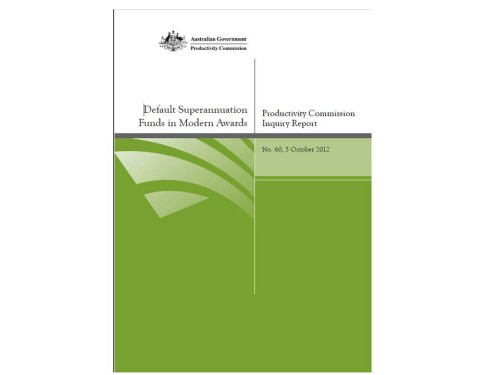PC after all: awards become APLs
The final report of the Productivity Commission (PC) into Default Super Funds in Modern Awards was released last week to furor from the retail segment and the Coalition, and endorsement from the industry funds and the Government.
Relative to the interim report and its reputation as an economic dry, it looks like the PC pulled its punches. It has certainly landed in a rather unexpected place, essentially ruling out the current process, but seeking to move forward via a new Default Superannuation Panel within Fair Work Australia.
Awards determine or influence the flow of a material proportion of the $60bn pa in employer contributions, so the way they work is important. Key aspects of the proposed process are:
– The Panel will consist of the FWA President, plus equal numbers of full-time members of the Tribunal, and part-time independent members appointed for their industry expertise.
– Independents cannot be representatives of organisations or parties to awards – ie competing funds, unions, employer bodies etc.
– Any fund can apply to have its MySuper product listed for an award – so an award could have dozens of MySuper products which meet a longlist criteria set.
– The Panel will apply criteria to select a shortlist “judged as best meeting the interests of the relevant employees”.
– The Panel should conduct ongoing assessments (but intended to remove funds only in exceptional circumstances) and wholesale reassessments every 4-8 years.
One of the most interesting reasons advanced by the PC for this approach was that it was not satisfied that a MySuper product would actually provide adequate member protections, or be of sufficient quality.
So what does this mean?
The proposed awards process now looks rather like the process to create approved product lists (APLs) often seen in retail wealth management. No-one likes it very much (apart from the incumbents), but every distributor uses one to place limits around what their representatives can do (for a variety of noble and not-so-noble reasons), so retail competitors are used to it.
Determining an APL of any type is obviously a position of enormous power, so the composition of the new Panel and how it operates will be of great importance.
This is particularly because the award APLs are not intended to change frequently. This is one of the bigger flaws of the proposed approach. The processes for removing underperforming funds are unclear, and you can be sure that any attempt would be bitterly contested by its related parties.
The infrequent review process also means that a check-in with market developments will occur rarely, which seems crazy given the pace of change. Notwithstanding the benefits of stability, this is a recipe tailor-made for incumbency, and the bad habits which go with that when there is insufficient competitive pressure to keep them on their toes.
So a lot will come down to how the Panel is comprised. It looks tilted in favour of the status-quo given that the majority will consist of FWA delegates. However the independents should carry great moral weight, quite apart from their expertise, so the nature of these appointments will be critical.
Will they be true independent experts who are well regarded by the industry as a whole? Perhaps an iconoclast or two? Or will they be what Yes Minister’s Sir Humphrey Appleby would describe as “sound”; ie someone who would know what the “right” answer was expected to be? All governments are guilty of the latter practice, and the current administration is no different in that sense.
Two observations remain:
– A change in Federal Government in late 2013 would likely see this approach overturned, and attempts made to disconnect super and awards entirely.
– If MySuper status is not good enough for award shortlisting, can someone please remind me again – what is the point of MySuper?

